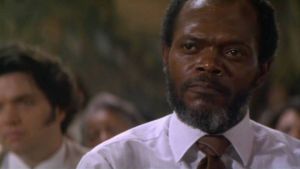A Time to Kill (1996)
A Time to Kill was released on July 24, 1996, in the USA. The American Drama film was produced by Jerry Bruckheimer Films. The movie storyline was written by Akiva Goldsman, and directed by Joel Schumacher. The movie was based on the novel A Time to Kill written by John Grisham in 1989[1].
Plot

Tony Hailey, a 10-year old black American girl, is raped by two white boys. Then, the Sheriff arrests the two boys and puts them into a temporary prison. Tonya's father, Carl Lee (Samuel L. Jackson), realizes that the two boys will walk free instead of going to prison. Thus, he takes his rifle, kills both boys within the country courthouse, yet injures Deputy Dwayne Looney unintentionally. Carl then gets arrested and Jake Brigance (Matthew McConaughey) tries to defend him as his lawyer. However, the trial goes wicked as Rufus Buckley (Kevin Spacey), the district attorney, is bias and decides to sentence Carl to the death penalty. Brigance forms his defense team to prove that Carl should be deliberated from the punishment. As the trial runs, the defense team gets threatened, injured, and even death due to racial demonstrations from the Ku Klux Klan. Lastly, Brigance proves that Carl should be free and said to be innocent by the jury[3].
Controversy
The movie depicts how justice does not served equally. In Mississippi, racism is quite common as Jake Brigance explains in the scene that white rapers can walk free even if they truly do rape African American women. It is shown from the movie that the Ku Klux Klan does whatever they can to stop the trial by creating a violent riot that causes injuries to lots of people, targeting to assassin Brigance, and threaten everyone who supports black Americans. The closing trial causes people realize the justice does not serve in the trial due to racism when Brigance tells the jury to close their eyes and imagine the rape story, he describes and painful detail of Tonya, and in the end, says" now imagine she is white". This closing argument deliberates Carl Lee and displays that the race status still affects the decision within the trial[4].
References
- ↑ https://www.imdb.com/title/tt0117913/?ref_=ttpl_pl_tt
- ↑ https://i1.wp.com/thespool.net/wp-content/uploads/2020/07/MV5BMDU5NzZiMjktM2E5My00NTAzLTk5YmUtMTM3ZTgyZGVkZmRmXkEyXkFqcGdeQXVyODg0OTM4NTc@._V1_.jpg?resize=1065%2C600&ssl=1
- ↑ https://www.spiritualityandpractice.com/films/reviews/view/4820/a-time-to-kill
- ↑ https://film-vault.fandom.com/wiki/A_Time_to_Kill